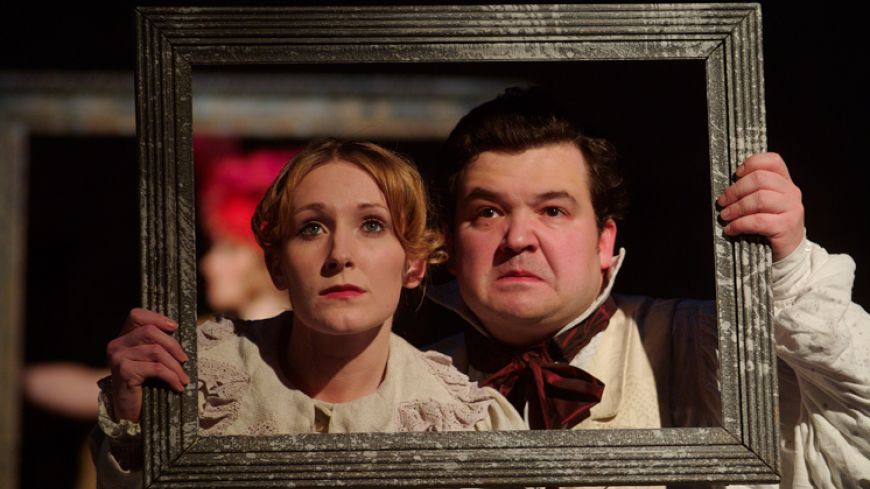
Vanity Fair by William Makepeace Thackeray is said to be the only epic English novel to challenge comparison in scale and thematic scope to Tolstoy's War and Peace.
Like a television soap opera, Victorian readers followed the thrilling serialisation of Vanity Fair, published in monthly instalments in Punch between January 1847 and July 1848.
After a gentleman's education at Cambridge, Thackeray squandered his inheritance on gambling while working as an artist, journalist and writer of humorous sketches. Based on his rather cynical observations of life and manners, Vanity Fair is a satirical lampooning of the corrupt values, vanities and morality of the aristocracy, middle classes and military imperialism in early 19th century British society. A period review of the novel noted "his genteel characters have a reality about them, drawn from actual life not from books and fancy."
With an introduction entitled "Before the Curtain" and 67 chapters, the dramatic scenario creates the ideal narrative for the stage. This version by Declan Donnellan was premiered by the Cheek by Jowl company at the Edinburgh Fringe 1983 when it won a Fringe First award before a successful international tour and a smash hit in London's West End.
In this new production, a cast of seven actors play the principal characters (and miscellaneous "others"), each taking the role of narrator in this fast paced, roller coaster of a plot, set during the Napoleonic war. Neil Murray has designed a delightful full scale puppet theatre stage within a stage, featuring a model of the Lyceum's ornate proscenium arch, ladders, mirrors, drapes and piles of wicker trunks.
The story begins at Miss Pinkerton's Academy for Young Ladies where our two heroines, Becky Sharp and Amelia Sedley, have just completed their education. Becky, the impoverished orphan daughter of an artist, is portrayed as a mischievous and cunning young woman determined to improve her social status while the wealthy and well-bred Amelia is in contrast, shy and sweet-natured. For both girls, marriage is the most important step to wealth and happiness. Becky begins to flirt with Amelia's bumptious brother Joseph (earning a fortune from the East India company), while Amelia is smitten by the effete and dashing Captain George Osbourne.
Using minimalist set and props, the company creates some brilliantly comedic scenes depicting a coach ride to Brighton (sitting on wicker basket seats, the passengers and driver bounce rhythmically to the horses trot), a punt on the river ("walking" trees denoting movement) and a grand aristocratic ball in Brussels.
Taking centre stage for much of the action, Sophia Linden (pictured), looking innocently demure in her crimson dress and dark ringlets, , looking innocently demure in her crimson dress and dark ringlets, plays the spiteful, two faced Becky with devious devilish charm. If Becky is the ladette, Amelia is the true lady, quietly portrayed by Kim Gerard with grace and a gradual developing maturity, not one to suffer fools gladly. As well as playing the main protaganists, the hard working ensemble introduce a virtual gallery of colourful caricature roles in an instant, with simply a top hat, wig, boy's cap, jacket or mask.
Behind all the slapstick humour and jollity, one episode sees Becky and Amelia's husbands going off to fight in the Battle of Waterloo, but with the effervescent speed of storytelling, the ensuing tragic outcome is given insignificant weight. Perhaps a dramatic pause and change of lighting would add a sudden chilling frisson to this crucial moment.
This minor quibble aside, there's little else to criticise in Tony Cownie's imaginative, elegant and beautifully choreographed production, fizzing with wit and energy. Jon Beales on piano provides musical accompaniment in the manner of a silent movie. This is a crazy, exuberant theatrical entertainment in which the themes of marriage, money, sexual attraction, morality and European politics are as much a part of middle class society today as they were in Thackeray's Victorian world.
Vanity Fair runs til Saturday 12 April, 2008

